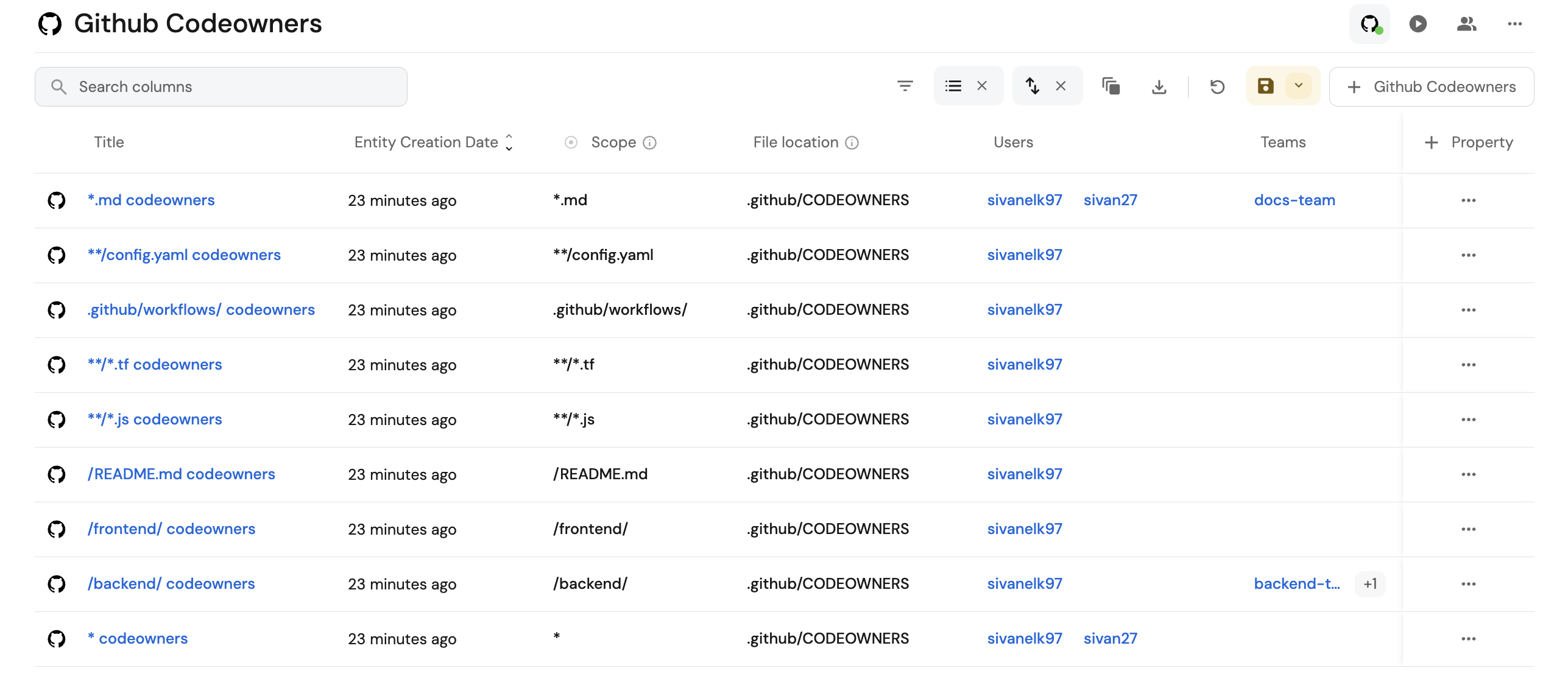Connect GitHub CODEOWNERS with Service, Team & User
This guide demostrates how to map CODEOWNERS file in GitHub repositories to their respective Service, Team and User blueprints in port.
Prerequisites
- A Port account.
- Install Port's GitHub app in your organization or in repositories you are interested in.
Once you install Port's GitHub app, the following blueprints will be automatically created in your data model: Repository, Pull Request, Github User, Github Team.
Set up data model
First, let's create the necessary blueprint to store the Codeowners data, then we will set up the mapping configuration.
Create the Codeowners blueprint
To add the CODEOWNERS blueprint:
-
Navigate to your data model page of your portal.
-
Click on the
+ Blueprintbutton. -
Click on the
Edit JSONbutton. -
Copy the following definition and paste it in the editor, then click
Save:CODEOWNERS blueprint (Click to expand)
{
"identifier": "githubCodeowners",
"description": "This blueprint represents a CODEOWNERS file in a service",
"title": "Github Codeowners",
"icon": "Github",
"schema": {
"properties": {
"location": {
"type": "string",
"title": "File location",
"description": "File path to CODEOWNERS file"
},
"scope": {
"icon": "DefaultProperty",
"type": "string",
"title": "Scope",
"description": "The scope which the user/team owns."
}
},
"required": []
},
"mirrorProperties": {},
"calculationProperties": {},
"aggregationProperties": {},
"relations": {
"users": {
"title": "Users",
"target": "githubUser",
"required": false,
"many": true
},
"teams": {
"title": "Teams",
"target": "githubTeam",
"required": false,
"many": true
},
"repository": {
"title": "Repository",
"description": "The repository which the CODEOWNERS file resides in",
"target": "githubRepository",
"required": true,
"many": false
}
}
}
Set up mapping configuration
-
Go to the data sources page of your portal.
-
Under
Exporters, click on your desired GitHub organization. -
A window will open containing the default YAML configuration of your GitHub integration.
-
In the bottom-left corner you can modify the configuration to suit your needs, by adding/removing entries.
-
Copy the following configuration and paste it in the editor, then click
Save & Resync:CODEOWNERS mapping configuration (Click to expand)
resources:
- kind: file
selector:
query: .repo.archived == false
files:
- path: '**/.github/CODEOWNERS'
port:
itemsToParse: >-
(. as $root | .file.content | split("\n") | map(trim) |
map(select((test("^[[:space:]]*#") | not) and (length > 0))) | map(
(split(" ") | map(select(length > 0))) as $tokens
| {
scope: ($tokens[0]),
# Replacing ** and * characters since the identifier can't contain special characters
identifier: ($tokens[0]
| gsub("\\*\\*"; "doublestar")
| gsub("\\*"; "star")),
# Extracting users and teams to their respective arrays
users: (
$tokens[1:]
| map(select(contains("/") | not)
| gsub("@" ; "")
)
),
teams: (
$tokens[1:]
| map(select(test("^@[^ ]+/[^ ]+$"))
| split("/")
| .[-1]
))
}
)
)
entity:
mappings:
identifier: .repo.full_name + "_" +.item.identifier + "_codeowners"
title: .item.scope + " codeowners"
blueprint: '"githubCodeowners"'
properties:
scope: .item.scope
location: .file.path
relations:
repository: .repo.full_name
teams:
combinator: '''and'''
rules:
- property: '"$title"'
value: .item.teams
operator: '"in"'
users: .item.users
Example
For the following CODEOWNERS file example:
CODEOWNERS file example (Click to expand)
# Default owner for all files in the repo
* @sivanelk97 @sivan27
# Backend ownership
/backend/ @sivanelk97 @sivan-org/backend-team @sivan-org/docs-team
# Frontend ownership (multiple owners)
/frontend/ @sivanelk97
# Specific file
/README.md @sivanelk97
# JavaScript files in any folder
**/*.js @sivanelk97
# Terraform files anywhere
**/*.tf @sivanelk97
# CI/CD workflows
.github/workflows/ @sivanelk97
# Config files named 'config.yaml' in any folder
**/config.yaml @sivanelk97
# Markdown documentation files
*.md @sivanelk97 @sivan27 @sivan-org/docs-team
The software catalog Codeowners page should display the corresponding Codeowners entities:
